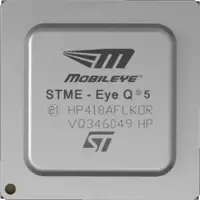From WikiChip
Difference between revisions of "mobileye/eyeq"
| Line 27: | Line 27: | ||
| socket 2 = | | socket 2 = | ||
}} | }} | ||
| − | '''EyeQ''' is a family of [[ | + | '''EyeQ''' is a family of [[autonomous driving SoCs]] designed for real-time visual recognition and scene interpretation. First introduced in 2004, those chips are used for driver assistance through level five driving automation. |
== Overview == | == Overview == | ||
Revision as of 18:59, 28 April 2019
EyeQ is a family of autonomous driving SoCs designed for real-time visual recognition and scene interpretation. First introduced in 2004, those chips are used for driver assistance through level five driving automation.
Overview
| This section is empty; you can help add the missing info by editing this page. |
Models
EyeQ1
| This section is empty; you can help add the missing info by editing this page. |
EyeQ2
| This section is empty; you can help add the missing info by editing this page. |
EyeQ3
| This section is empty; you can help add the missing info by editing this page. |
EyeQ4
| This section is empty; you can help add the missing info by editing this page. |
EyeQ5
| This section is empty; you can help add the missing info by editing this page. |
See also
Facts about "EyeQ - Tesla"
| designer | Mobileye + |
| first announced | March 8, 2004 + |
| first launched | March 8, 2004 + |
| full page name | mobileye/eyeq + |
| instance of | system on a chip family + |
| main designer | Mobileye + |
| manufacturer | STMicroelectronics + and TSMC + |
| name | EyeQ + |
| process | 180 nm (0.18 μm, 1.8e-4 mm) +, 90 nm (0.09 μm, 9.0e-5 mm) +, 40 nm (0.04 μm, 4.0e-5 mm) +, 28 nm (0.028 μm, 2.8e-5 mm) + and 7 nm (0.007 μm, 7.0e-6 mm) + |
| technology | CMOS + |
